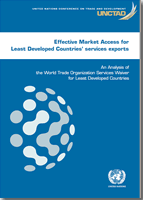
This paper was prepared in the context of UNCTAD’s intensified work in support of least developed countries’ (LDCs) participation in trade. It aims to contribute to the discussion on market access for services and services suppliers from LDCs. In particular, in the context of the World Trade Organization (WTO) services waiver decision adopted on 17 December 2011 (hereinafter “the waiver”).
For many years UNCTAD has been emphasizing the importance of services and services trade for developing countries, and the need to strengthen and diversify services sectors. This includes a focus on services and services-supported exports. Over the past 30 years the share of services in the gross domestic product (GDP) of developed countries has grown from 61 to 75 per cent, while the share in developing countries has grown from 42 to 55 per cent. In LDCs, the share was and is still lower, but the growth trajectory is very clear: services are a key part of their economic future. Trade in services remains important as their exports have grown more than goods exports and more resiliently.
In addition to these direct effects, services provide inputs to all economic sectors. They are bundled with goods, for example when manufacturing firms also provide distribution services. They also create linkages in productive value chains, as in the case of telecommunication and information and communication technology (ICT) services which integrate, through digitization, production processes more than ever before. These indirect effects imply that there is value added of services included in output and exports of all economic sectors. While direct exports of services were 13 per cent of total exports in LDCs, services accounted for 39 per cent of total value added in their exports. This value added, the so called “Mode 5” of services trade, confirms that servicification trends also occur in international trade and place services as a key contributor to trade as it is for output.
The LDCs services waiver, which effectively operates as a new LDC-specific ‘Enabling Clause for services’, now allows developed-country WTO Members and developing WTO Members in a position to do so to provide preferential treatment to services and service suppliers originating in LDCs. Consequently, the waiver releases WTO Members from their legal obligation to provide non-discriminatory Most Favoured Nation (MFN) treatment to all trading partners when granting trade preferences to LDCs as per the General Agreement on Trade in Services (GATS) Article II.
After a slow start, WTO Members eventually took up the challenge in implementing the waiver. Since 2015 developed and several developing Members, in total 24 WTO Members (counting the European Union as one), have submitted notifications granting specific preferences to LDCs under the waiver. This was an important start, but more remains to be done.
Perhaps most importantly, the waiver has been a catalyst for a growing discussion and growing awareness among policy makers, service suppliers and other stakeholders both from LDCs and from current and potential importers of LDCs’ services. But the task at hand for all those interested in LDCs and their services trade integration goes beyond the operationalization of the waiver. The waiver is just one tool among others, from autonomous liberalization to regional and bilateral agreements, that enables services liberalization in favour of LDCs.
The waiver itself neither requires WTO Members to grant preferences nor provides them with specific ideas or tools to devise smart mechanisms that facilitate LDCs’ services exports into their markets. Thus, even if the range of preference-granting countries itself is noteworthy, the breadth, depth and real-life relevance of the preferences offered require and deserve attention, not least with a view to diversifying and sharpening the tools to provide effective pro-development access to services markets of export interest to LDCs.
UNCTAD has an important role to play in fostering, facilitating and enriching this discussion among all those who care about LDCs and their considerable potential in services. In 2016 UNCTAD commissioned a study on “LDCs Services Waiver–Operationalized?”
The study carried out an in-depth assessment of the preferences offered in the context of the waiver and juxtaposed them with what LDCs had asked for through their Collective Request. This deliberation has now been further developed in the current overview paper enriched by findings from the four pilot country studies, namely Cambodia, Nepal, Senegal and Zambia, that accompany this overview.
The overview is intended to assist negotiators and policymakers in the WTO Members and LDCs in their efforts in identifying, designing and implementing smart mechanisms that could facilitate LDCs’ services exports.
This exercise remains by its nature necessarily a limited one, a work in progress that should stimulate further, progressively broader and deeper engagement by LDCs’ governments, LDCs’ services importers and other stakeholders, on the obstacles encountered and the solutions to be sought. UNCTAD’s hope and ambition is to encourage stakeholders to carry the discussion forward, and to support them in this endeavour.

Director, Division on International Trade and Commodities
UNCTAD


